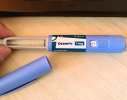Can you look over this study glp1 lowers myostatin
Results: Ex-4 suppressed the expression of myostatin (MSTN) and muscle atrophic factors such as F-box only protein 32 (atrogin-1) and muscle RING-finger protein-1 (MuRF-1) in Dex-treated C2C12 myotubes. The suppression effect was via protein kinase A and protein kinase B signalling pathways through GLP-1R. In addition, Ex-4 treatment inhibited glucocorticoid receptor (GR) translocation by up-regulating the proteins of GR inhibitory complexes. In a Dex-induced muscle atrophy model, Ex-4 ameliorated muscle atrophy by suppressing muscle atrophic factors and enhancing myogenic factors (MyoG and MyoD), leading to increased muscle mass and function. In the CKD muscle atrophy model, Ex-4 also increased muscle mass, myofiber size, and muscle function. In addition, treatment with a long-acting GLP-1R agonist, dulaglutide, recovered muscle mass and function in DBA/2J-mdx mice.
Conclusions: GLP-1R agonists ameliorate muscle wasting by suppressing MSTN and muscle atrophic factors and enhancing myogenic factors through GLP-1R-mediated signalling pathways. These novel findings suggest that activating GLP-1R signalling may be useful for the treatment of atrophy-related muscular diseases.
Keywords: Chronic kidney disease; Dexamethasone; Duchenne muscular dystrophy; GLP-1R agonists; Glucocorticoid receptor; Skeletal muscle atrophy.
Skeletal muscle atrophy is defined as a reduction of muscle mass caused by excessive protein degradation. However, the development of therapeutic interventions is still in an early stage. Although glucagon‐like peptide‐1 receptor (GLP‐1R) agonists, ...

www.ncbi.nlm.nih.gov



